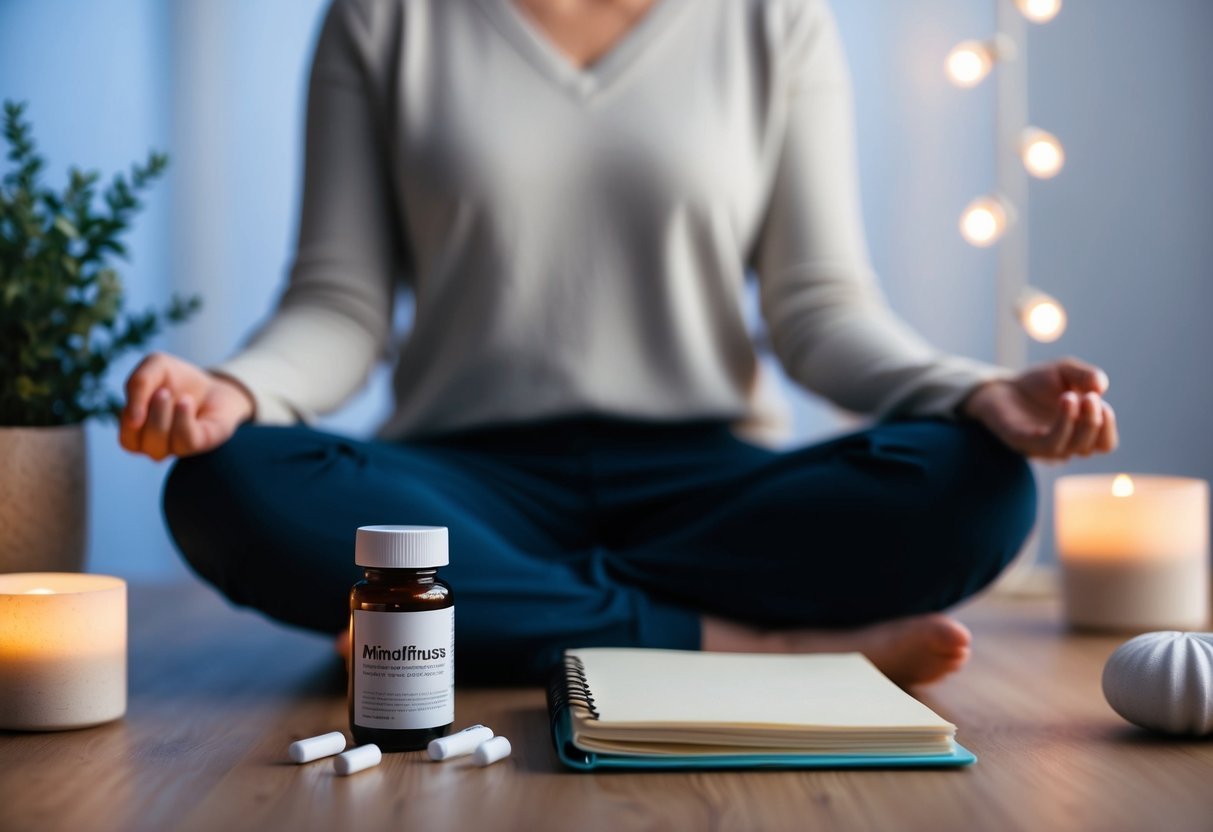PsychNewsDaily Publishers
100 Summit Drive
Burlington, MA, 01803
Telephone: (320) 349-2484
PsychNewsDaily Publishers
100 Summit Drive
Burlington, MA, 01803
Telephone: (320) 349-2484
Anxiety disorders cause excessive fear and worry, impacting daily life. Treatment options include antidepressants and mindfulness practices, both effective in reducing anxiety symptoms.


Many people suffer from anxiety disorders, which cause feelings of fear and worry. Treatment options include antidepressants and mindfulness practices. These methods can help improve mental health and reduce anxiety symptoms.
Anxiety disorders are characterized by excessive fear or worry that interferes with daily life. Common types include generalized anxiety disorder, panic disorder, and social anxiety disorder. Symptoms may include rapid heartbeat, sweating, and trouble concentrating.
Anxiety disorders can arise from a mix of genetic, environmental, and psychological factors. Stressful life events, such as trauma or loss, can trigger symptoms. It is essential for individuals to recognize their feelings and seek appropriate help.
Antidepressants are commonly prescribed to treat anxiety disorders. They help balance chemicals in the brain, like serotonin, which affects mood and emotions. The most common types include selective serotonin reuptake inhibitors (SSRIs) and serotonin-norepinephrine reuptake inhibitors (SNRIs).
While effective for many, antidepressants can have side effects. These may include weight gain, dizziness, or fatigue. It often takes several weeks to see improvements. Patients should discuss any concerns with a healthcare provider for a safe treatment plan.
Mindfulness involves focusing on the present moment without judgment. It can help reduce anxiety by promoting relaxation and emotional awareness. Practices like meditation and deep breathing enable individuals to manage stress effectively.
Recent studies suggest that mindfulness can be as effective as certain antidepressants for treating anxiety. Programs typically last eight weeks and teach skills to handle anxiety. Engaging in mindfulness can lead to improved mental health and overall well-being.

Mindfulness techniques offer practical ways to reduce anxiety and promote a sense of calm. They often involve meditation practices that encourage being present in the moment, making them effective in managing anxious thoughts. Two key methods are mindfulness meditation and mindfulness-based stress reduction (MBSR).
Mindfulness meditation encourages individuals to focus their attention on their breath, body sensations, or thoughts without judgment. This practice helps shift their perspective on anxiety. By observing thoughts as they arise, they can create distance from troubling feelings.
Here are some key points about mindfulness meditation for anxiety:
Consistency in practice is important. Regular mindfulness meditation can lead to lasting changes in how a person responds to anxiety.
Mindfulness-Based Stress Reduction (MBSR) is an organized program designed to help individuals manage anxiety through structured practices. This program typically lasts about eight weeks and includes guided meditations, body awareness exercises, and group discussions.
Key components of MBSR include:
Research indicates that MBSR can be as effective as medication for anxiety treatment. This makes it a valuable option for those seeking alternative forms of relief.

Mindfulness practices and antidepressants are two popular options for treating anxiety disorders. They have different methods of addressing symptoms and may affect individuals in various ways. Understanding how each option works can help in making informed decisions.
Mindfulness, particularly through mindfulness-based stress reduction (MBSR), has shown effectiveness in reducing anxiety symptoms. Studies suggest that it can work as well as traditional antidepressants like escitalopram (commonly known as Lexapro).
Antidepressants, especially selective serotonin reuptake inhibitors (SSRIs), aim to balance chemicals in the brain that influence mood. Many people find relief from anxiety symptoms with these medications. However, they can take weeks to show results and may have side effects, such as nausea or weight gain.
Mindfulness not only helps with anxiety but may improve overall quality of life. Practicing mindfulness encourages individuals to stay focused on the present moment. This approach can lead to better emotional regulation and increased resilience to stress.
On the other hand, antidepressants can provide quick symptom relief but might not address the root causes of anxiety. Some people may experience a temporary sense of well-being while on these medications. Long-term use may require ongoing adjustments or changes in dosage, impacting overall life satisfaction.
Choosing between mindfulness and antidepressants depends on personal preferences and comfort levels. Mindfulness requires commitment and practice but offers a drug-free approach. It can be integrated into daily life with various techniques, such as meditation and breathing exercises.
Antidepressants may be more suitable for those seeking immediate symptom relief. They can be an essential part of a broader treatment plan. It’s important for individuals to consult healthcare providers to determine the best option based on their specific needs and circumstances.

Integrative approaches focus on combining various methods to help manage anxiety. Using mindfulness alongside physical activities like exercise and yoga can enhance mental wellness. These practices target both the mind and body, providing a comprehensive way to address anxiety.
Exercise plays a vital role in managing anxiety. Physical activity releases endorphins, which can improve mood and reduce stress. When combined with mindfulness techniques, this approach becomes even more effective.
Practicing mindfulness during exercise encourages individuals to focus on their breathing and bodily sensations. This combination helps cultivate awareness and reduces anxious thoughts. Activities like jogging, swimming, or dancing can be done mindfully, allowing for a deeper connection to the body and an uplifted spirit.
Yoga integrates mindfulness with physical movement, making it an excellent tool for anxiety management. It combines breath control, meditation, and postures, promoting relaxation and physical health.
Specific yoga styles, such as Hatha or Yin yoga, are especially beneficial for calming the mind. They allow practitioners to slow down and connect with their breath. Regular yoga practice may help reduce feelings of anxiety and improve overall well-being.
Integrative therapies encompass various techniques that can support anxiety treatment. Mindfulness-based practices, for example, have been shown to be as effective as traditional psychotherapy and some medications.
Therapies may include guided meditation, progressive muscle relaxation, or cognitive behavioral strategies. These methods often complement each other, providing a holistic way to address anxiety. Engaging with multiple approaches can help individuals find what works best for them, leading to a more personalized experience in managing anxiety.

Tracking how well treatments for anxiety are working is important. Different methods, including standardized scales and recent research, help understand the effectiveness of mindfulness and antidepressant therapies.
Standardized scales are tools that help measure anxiety levels. They provide a consistent way to evaluate how a person feels over time. Common scales include the Beck Anxiety Inventory (BAI) and the Hamilton Anxiety Rating Scale (HAM-A).
These scales ask about symptoms and feelings. They give scores that show progress in treatment. For instance, a lower score on the BAI indicates reduced anxiety. Using these scales can help patients and doctors see how mindfulness or medication impacts anxiety levels.
Regular assessments using these standardized tools lead to informed decisions. Adjustments can be made to the treatment plan based on the results. Clear tracking helps both patients and healthcare providers know what works best for each individual.
Research conducted by Georgetown University Medical Center sheds light on mindfulness compared to antidepressants. This study focused on how mindfulness-based therapies reduce anxiety.
It found that patients who practiced mindfulness showed significant improvement. This was similar to those taking antidepressants. Both groups reported lower anxiety levels after treatment.
The study highlights mindfulness as a valid option. It encourages exploring how mindfulness could fit into treatment plans alongside or instead of medications. This research suggests that patients might achieve positive outcomes with mindfulness-based approaches, making it a hopeful alternative for anxiety management.

Mindfulness meditation is gaining attention as a way to help manage anxiety. Many people wonder how it compares to traditional medications like antidepressants and what the current research says.
Mindfulness meditation can help people become more aware of their thoughts and feelings. This increased awareness allows them to observe their anxiety without judgment. It can also promote relaxation, reduce stress, and improve overall emotional well-being.
Research suggests that Mindfulness-Based Stress Reduction may be as effective as certain medications for anxiety disorders. Both treatments have shown to lower anxiety levels significantly. This provides options for individuals seeking relief from their anxiety symptoms.
Meditation has been found to help ease anxiety symptoms, much like the medication Lexapro. Some studies indicate that it can serve as an alternative for those who prefer not to use pharmaceuticals. However, results can vary from person to person.
Current studies show promising results for mindfulness meditation in managing both anxiety and depression. Meta-analyses highlight significant reductions in symptoms among participants practicing mindfulness. It reveals that meditation can be a valuable tool in mental health treatment.
Choosing between mindfulness and antidepressants depends on individual needs and circumstances. Some may prefer mindfulness as a natural option, while others might find medication necessary. Consulting a healthcare professional can help clarify the best approach.
Regular practice is key to seeing results from mindfulness meditation. Experts often recommend practicing daily, even if for a short period. Consistency can lead to better management of anxiety symptoms over time.